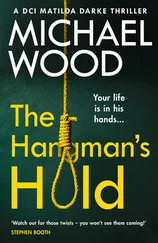“Like what?” Deirdre said.
“Oh, about what she did before she stopped work to look after her mother. Whether she resented giving up a busy life. All that sort of thing. She was angry. Said it wasn’t fair, they should leave her alone when she was grieving for her mother.”
“Huh!” Ivy said. “For a grieving daughter she seems to have a lot of gentlemen callers!”
“Comfort and support, Ivy,” said Gus, and laughed. “But in my case, a useful piece of information gathering.”
“What else did she say?” Roy said.
“She talked a lot about Theo,” Gus said, glancing apprehensively at Deirdre. “She was really upset, and said she could never find out why he suddenly broke off their weekly love-in sessions in Hangman’s Row. I asked her if her mother had any explanation, and she said the old woman had been really cruel. Said Mr. Theo had found better fish to fry. He was a toff, she said, and toffs didn’t get serious about farmworkers’ daughters. He’d got fed up with Miriam, and no wonder, her mother had said. He could have the pick of the county. Miriam was just handy when he felt randy. She’d gone on taunting her, and Miriam had wept for days.”
“And you believed all that codswallop?” Ivy said sharply.
“Sounded convincing to me,” Gus said innocently. In fact, he had not believed a word of it. He had decided after an intimate lunch with Miriam that she was one of those fantasists who ends up not being able to tell the difference between truth and lies. It was what she didn’t say that convinced him she knew the whole sordid story. Once or twice, when Theo’s dad was mentioned, she had started a sentence and then broken off, as if editing what she was telling him.
“Well, looks like I’ll have plenty to ask Theo next Saturday,” Deirdre said.
There was an embarrassed silence. Ivy raised her eyebrows, and said that if Deirdre asked her, she would suggest asking the questions when she first arrived at the Hall, and then there would be plenty of time afterwards for this, that and the other.
“First time I’ve heard it called that,” Roy said conversationally. Deirdre ignored him, and said icily if Ivy would like to make out a list of questions, she would certainly do her best to carry out her duties efficiently.
“The other urgent thing,” Gus said, firmly changing the subject, “will be to find out what happened to Beattie’s twin brother. Got any ideas how we do that, team?” he said, hoping to inject a professional note. Never again, he said to himself, will I work with geriatrics. Then he exempted Deirdre from this. He reckoned she was not much older than him, bless her. She’d been good company yesterday.
Now she made a sensible suggestion. “I think we should start by assuming that he kept the same name as Beattie, before she changed it. Bentall, I mean. We can look up all the Bentalls around Oakbridge first, then the whole county. There should be records of the foster parents, too, but you can bet your bottom dollar they’d be strictly confidential. Angry father of twins sent packing by Mayor Bentall, might seek custody, etcetera.”
“We need to know who was the father of the twins,” Ivy said. Once more there was a silent pause. Then she continued, “Any guesses?”
Deirdre looked at her watch. “Oh, my goodness!” she said. “I really have to go into town for a volunteers meeting at social services. While I’m there, I can ask about fostering rules in those days. Might turn up something. Would you like a lift back to Springfield?” she asked, looked first at Ivy and then Roy.
“We’ll walk,” they chorused.
Gus laughed. “I’ll see them safely back,” he said, and the meeting ended amicably.

MIRIAM BLAKE STOOD at the sink, looking out at her untidy back garden. When her father was alive, it was immaculate. He spent hours out there with his neat rows of vegetables and flowers to cut for the house. He loved flowers, but his wife didn’t. She said they were all right for a few days, then they dropped petals all over the place and the water smelled awful. Without saying anything, he continued to bring them in and Miriam arranged them for him. It was a silent revolt, a conspiracy between father and daughter against wife and mother. Mrs. Blake’s only defence was to throw them out after a day or two, long before it was necessary.
Now there were no flowers, and only exhausted perennials struggled through. Perhaps she could get Gus to take it in hand for her? Now he had been unable to resist her cooking, and, she hoped, her charms, she would feel quite happy about asking him.
What a week it had been so far! First of all, Theo coming in and buttering her up, reminding her of the good old days, asking how she was managing and whether she had decided to go back to work. She’d made him coffee, and he had been so nice and kind. But she saw now that it was all a ruse to soften her up. He’d got up to go, and then said he had nearly forgotten what he’d come to say. This was, of course, to tell her he had to put up her rent to a realistic level, same as the others in the terrace, but if she couldn’t afford it, he would help her with housing benefit and see that she found an affordable council house. He had friends in high places, he had laughed. She had not seen the joke. It was clear that her new pal Beattie’s promise to keep the rent low was now overruled.
Then, thank goodness, there was today, making it all come right again, at least for a while. Gus would champion her cause, she was sure of that. He’d had a lot of experience, he’d said, with bringing justice to people who’d been wronged. And the other way round! She was sure he had brought many a wrongdoer to justice. They’d had such a lovely talk. She couldn’t wait until he called again. And if he didn’t she would pop next door and see how he was getting on. After all, he’d had a serious fall, and it was the least she could do.
She dried up the dishes and put them away. The afternoon sun was still warm, and she decided to have a stroll to the village shop. It was taking her quite a while, she realised, to make use of her new-found freedom. She could go anywhere at any time. So long as she didn’t leave the country! The police inspector had been firm about that. She felt the shadow of suspicion darkening her good mood, and shook herself. Fresh air and exercise, that’s what she needed, and she locked up the house and stepped out at a brisk pace.
She met a couple of village people who’d known her for years and would always pass the time of day. But they looked the other way, and hurried on. She knew why, and tried to forget the snub. But then, when she reached the shop, it was full, and she had to stand and wait. The minute she had arrived through the door, silence had fallen. Nobody greeted her, except Will behind the counter, and even he looked embarrassed. The woman who lived next door to the shop, Mrs. Broomfield, was helping Will, and she studiously ignored Miriam when it came to her turn.
“Well,” said Miriam loudly, plucking up courage. “I thought it was supposed to be innocent until proved guilty in this country?”
The huddle of gossips over by the DVDs for hire immediately began talking about their favourite film, and Will moved across to where Miriam stood.
“Good morning, Miriam!” he said. “Lovely morning!” He now had to make an important decision. Sadie Broomfield was going away for a week, and he needed to replace her. Now that Miriam was free, she would be the obvious choice. She’d done it before, and needed no initiation into the workings of the village shop. But although he had tried hard not to let it influence him, the fact that most people suspected Miriam of murdering her mother meant that the shop would be avoided for a week. Could he afford that?
Читать дальше












